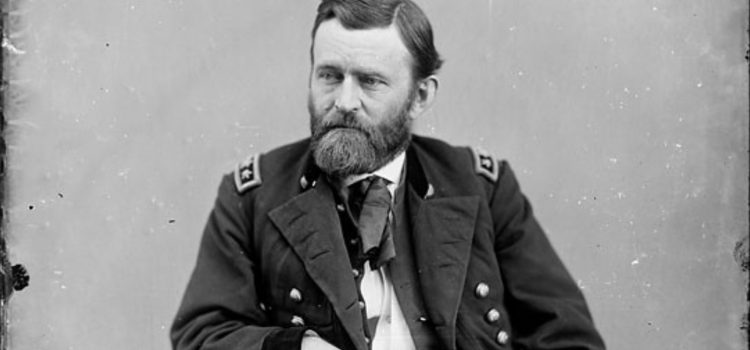

This article is an excerpt from the Shortform book guide to "Grant" by Ron Chernow. Shortform has the world's best summaries and analyses of books you should be reading.
Like this article? Sign up for a free trial here.
Was Ulysses S. Grant a civil rights activist? How did Grant help Black citizens during his presidency?
For Ulysses S. Grant, civil rights was an important issue that needed to be protected after the Civil War. In his book Grant, Ron Chernow argues that Grant’s work as president was essential for safeguarding Black citizens’ civil rights and helping them transition out of slavery.
Below we’ll focus on three key instances of Grant encouraging civil rights.
Passing the Fifteenth Amendment
In the first of three instances of Ulysses S. Grant’s civil rights advocacies, Chernow argues that Grant’s advocacy was key in accomplishing the ratification of the Fifteenth Amendment, which secured the right to vote for Black American men. He points out that in his 1869 inauguration speech, Grant explicitly expressed his belief that a new amendment should guarantee suffrage for Black men. Chernow contends that because Grant’s voice held serious sway, even among Southern states, his endorsement of the Fifteenth Amendment on a national stage led directly to its ratification—a view shared by George Boutwell, the Amendment’s author.
(Shortform note: Because Constitutional amendments must be ratified by three-fourths of US states, the Fifteenth Amendment only officially became part of the Constitution on February 3, 1870, when Iowa became the 28th state (out of 37 total states) to ratify it. Several states, however, never ratified the Fifteenth Amendment in the 19th century—namely, Delaware, Oregon, California, Maryland, Kentucky, and Tennessee. These states ultimately ratified the Fifteenth Amendment at different times in the 20th century, from 1901 in Oregon to 1997 in Tennessee.)
Passing the Third Enforcement Act
Moreover, Chernow maintains that Grant protected freedmen from racial violence by asking Congress to pass the Third Enforcement Act, better known as the Ku Klux Klan (KKK) Act. For context, the KKK (a white supremacist terror group founded by Confederate veterans in 1865) perpetrated widespread racial violence against freedmen in Southern states following the Thirteenth, Fourteenth, and Fifteenth Amendments that established legal protections for ex-slaves. Through many racially driven massacres of Black citizens, the KKK sought to protest the recent enfranchisement of Black Americans.
(Shortform note: In addition to outright violence, the KKK also used more procedural methods to disenfranchise Black Americans by helping enforce Jim Crow Laws—state and local laws that sought to prevent freedmen from voting without explicitly violating the Fifteenth Amendment. For example, the KKK helped enforce poll taxes, which charged freedmen a prohibitive fee to vote, as well as literacy tests, which required them to read a section of state constitutions—a difficult task for people who had recently been uneducated slaves.)
To root out this violence, Grant petitioned Congress to pass the KKK Act, giving him authority to declare martial law, deploy federal troops to Southern states, and suspend habeas corpus—detainees’ right to have their detention assessed in court. Consequently, Grant’s troops could freely detain suspected Klansmen without providing them a hearing with a judge, which allowed him to aggressively prosecute Klan activity. As Chernow writes, Grant’s efforts stemmed the flood of racial violence, effectively destroying the KKK by 1872.
(Shortform note: One key provision of the KKK Act still exists today in Title 42 of the United States Code, Section 1983, which provides plaintiffs the right to sue in civil court for deprivation of their civil rights. In practice, this is the primary statute by which alleged violations of constitutional rights are brought to court.)
Funding the Bureau of Education
Finally, Chernow suggests that Grant supported ex-slaves’ transition to productive citizens by funding the Bureau of Education. As Chernow relates, the Bureau of Education was originally established in 1867 to educate ex-slaves and prepare them to contribute to society, but Congress had cut its budget during the previous Johnson Administration. Grant, however, not only provided new funding to the Bureau of Education, but he also enlisted John Eaton—the chaplain who supervised Grant’s contraband camps in the Civil War—to ensure the Bureau’s success. Chernow points out that, according to Eaton himself, Grant’s support lifted the Bureau of Education from relative obscurity to significant influence and success.
(Shortform note: Some experts maintain that, contrary to Chernow’s assessment, the Bureau of Education was essentially powerless during Eaton’s tenure. According to one historian, the Bureau of Education was subject to strict congressional scrutiny since 1867, as Southern states were concerned that a federal education bureau would trample on states’ rights to govern education as they see fit. For this reason, he points out that during Eaton’s tenure, the Bureau of Education lacked substantial authority to directly impact educational policy and could only offer vague recommendations designed to guide individual states.)

———End of Preview———
Like what you just read? Read the rest of the world's best book summary and analysis of Ron Chernow's "Grant" at Shortform.
Here's what you'll find in our full Grant summary:
- A biography of Ulysses S. Grant that paints him in a new light
- Grant's role in the Civil War and as president of the United States
- How Grant fought valiantly against alcohol addiction






